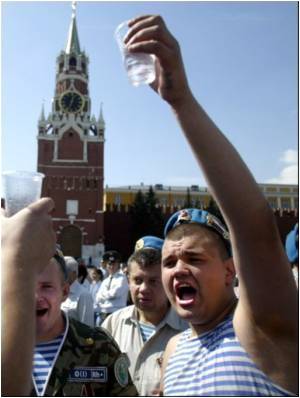When police officers arrived at 13-year-old Masha's home, searched her room and inspected her computer, it was not because they suspected her of any crime.

"It was offensive and frightening at the same time," said Masha, a schoolgirl in the Armenian capital, clearly upset by the experience.
Police in Yerevan have been conducting a campaign against the capital's small but controversial emo community since the recent suicides of two teenagers who were rumoured to have been emo fans.
They claim that the subculture represents a threat to young people's welfare.
Officers have visited schools, searched pupils whose distinctive clothing marks them out as possible 'emos', and mounted surveillance on public places where young people gather.
Several fans have been detained for questioning, despite the lack of any specific legislation against the musical genre or its followers.
Advertisement
Emo -- an abbreviation of 'emotional' -- is a more melodic and melancholy form of punk rock. It has origins in the United States but has become a well-established global subculture in recent years.
Advertisement
But they now feel that they have to disguise themselves in ordinary clothes for fear of detention or harassment by other youths. "They point and laugh at us. Or even worse, they sometimes beat up our boys," Ani said.
Sensationalist media reports in Europe have suggested that the gloomy lyrics of some emo songs can influence teenagers to harm themselves or attempt suicide, although fans have consistently rejected the accusation.
Emo devotees in Britain and Russia staged protests two years ago against what they saw as negative stereotyping.
Some people in Yerevan not only believe that emo can cause suicidal depression, but also see it as a degenerate Western influence on traditional Armenian values.
Members of the youth wing of a local police association held a march against the subculture in the capital this month, carrying banners that read "No to foreign perversions!"
One teacher in a Yerevan suburb, who asked not to be named, said the directors of some schools supported the police action, and had even been actively encouraging officers to search pupils who dressed unusually and check them for signs of self-harm.
"We suspected one female pupil of being an emo. We invited our district policeman and the pupil's parents to come in, and explained how dangerous the consequences of this could be," the teacher said.
A local human rights activist compared the police's behaviour to a Communist-era witch-hunt.
"It is like the repression in Soviet times, when law enforcement agencies were chasing hippies, punks and rockers -- all those who refused to live within society's limits and be like everyone else," said Mikael Danielian, chairman of the Helsinki Committee of Armenia.
But the police say they are only intervening to protect vulnerable youngsters. "We are simply doing our job," said the police colonel responsible for youth affairs, Nelli Durian.
"We are conducting explanatory, preventative work among teenagers and their parents to prevent children from becoming hooligans and from thoughts of suicide."
However, she said that she could not blame emo music for the reported rise in teenage suicide attempts in Armenia this year.
Young fans like Masha and Ani have been worried by the anti-emo campaign, but they insist that they will not be pressured into abandoning the subculture that they love.
"It is impossible to ban youth movements using repressive methods," Ani said defiantly. "We will not stop listening to our music and dressing how we like. This is my choice."
Source-AFP









